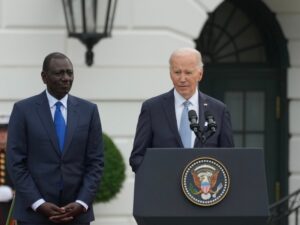A Close Relationship With Kenya Is Essential to Our Country’s Success
Senator Chris Coons will give featured remarks on the reauthorization of AGOA at a hybrid event held at the Wilson Center, co-hosted by WITA, on Tuesday, June 18. Information can be found here. The following is an excerpt from his recent opinion piece, published by The Hill.
Kenya is one of our most critical allies on an increasingly important continent; a booming population means that within a decade, 1 in 5 people on the planet will be living in Sub-Saharan Africa. While the rest of the world gets older, the median age in Africa is only 19. African countries have massive reserves of critical minerals, renewable energy, and arable land. It is their human resources, however, that are most valuable and some of the fastest growing in the world.
Someone who understands these facts well is U.S. Ambassador to Kenya Meg Whitman. In the burgeoning tech hub of East Africa, Whitman has been a tireless cheerleader for Kenya’s economic growth and potential. She has championed its growing manufacturing sector and its compelling use of renewable energy sources, which power most of the country’s energy needs.
Whitman’s approach is exactly what’s needed in Africa as a whole: an enthusiastic U.S. push for democratic ideals coupled with equitable economic growth. Through the bipartisan African Growth and Opportunity Act (AGOA), the United States has for two decades provided broad market access to sub-Saharan African countries and encouraged U.S. private sector investment. It also incentivizes good governance, workers’ rights and the rule of law. In Kenya, AGOA has jump started the emergence of a promising apparel sector, creating job opportunities and economic growth.
Unfortunately, AGOA [African Growth and Opportunity Act] expires next year. Without an early reauthorization, global industry may turn away from opportunities in Africa. That’s why Sen. Jim Risch (R-Idaho) and I introduced the AGOA Renewal and Improvement Act of 2024 last month. This bill would extend the program to 2041, providing businesses the long-term certainty they need to move their supply chains away from China and invest in Africa.
Kenya is more than just part of a growing economic bloc, however — it is an example for its neighbors in a rapidly changing part of the world. Kenyans have fought hard to be a democracy on a continent that has more coups than any other. A country that is already facing the effects of climate change, Kenya has stepped up to the plate as a partner in conservation efforts. In this, too, the United States can do more. By bolstering public-private partnerships in communities that manage protected and conserved areas, we can protect the environment while investing in the people who live in and around these natural wonders.
Read the Full Opinion Piece Here
05/25/2024 | Senator Chris Coons | The Hill
Behind Japan’s U.S. Steel Bid: An Aging, Shrinking Home Market
When Japan’s industrial titan Nippon Steel sought to acquire U.S. Steel late last year, it set off a chorus of American opposition.
Union leaders and lawmakers railed against the deal in language reminiscent of the U.S.-Japan trade wars of the 1980s and 1990s. President Biden — nodding to swing state votes in steel country — said U.S. Steel must remain “domestically owned and operated.”
Leave aside the election year politics — and how it tests the ability of an American company to pursue what it sees as the most logical strategy for itself. The bid reflects Japan’s rise to the largest foreign investor in American businesses. And this investment surge is unlike those of years past when Tokyo’s overseas expansion was part of its rising economic clout. Today, the opposite is true.
Japan’s relentless population decline is causing its market to shrink. So Japanese companies are turning to the U.S. for growth, thereby setting a precedent for other foreign companies facing similar demographic challenges in their home markets.
It is a precedent Washington policymakers would do well to note. The Nippon Steel bid illustrates how, in the coming years, more foreign companies with declining populations are going to seek to invest in the U.S.
This is a trend the U.S. should welcome and seek to leverage while making sure investments come from trusted allies, not from strategic rivals, including China, to avoid leakage of technology.
Foreign investments — particularly those in manufacturing — create both jobs and fresh opportunities for local businesses. Rural areas such as midwestern factory towns will be beneficiaries.
Allied investments bring capital and innovation that allow the U.S. to better compete against China. The Biden administration, through “friendshoring,” is already working with allies and likeminded nations to strengthen and secure supply chains for critical products. That strategy should include embracing U.S.-bound investments from those same close allies, starting with Japan.
Big beneficiaries of this approach will be American workers, especially those without college degrees, who tend to gain from good manufacturing jobs.
06/12/2024 | Yuka Hayashi | Progressive Policy Institute
The US, Canada, and Mexico Need a More Coordinated Approach to Their Trade Relationships With China
As the U.S. tightens trade and investment restrictions with respect to China and invests in developing critical sectors such as semiconductors, electric vehicles (EVs), and clean energy, deeper cooperation between the U.S., Canada, and Mexico under the United-States-Mexico-Canada Agreement (USMCA) is needed. The USMCA gives businesses and traders certainty about the economic relationship between the three countries, and the long history of their cooperation should make North America the key economic platform for a more competitive and dynamic economy that is best placed to reduce exposure to Chinese supply chains and compete globally. However, in order for this to happen, USMCA countries need to work together to address the gaps that have opened between U.S. trade and investment restrictions on China and Mexico and Canada’s trade and investment settings. Going forward, the U.S. should coordinate more closely with Canada and Mexico on any new trade and investment restrictions applied to China. The fact is that for the U.S. to effectively de-risk its economic relationship with China, a more coordinated North America approach is required. Failure to build a cohesive North American approach will likely lead to the U.S. adopting a more go-it-alone, less effective approach when it comes to China, and would be a missed opportunity to further strengthen North American economic relations.
The economic importance of North America
Trade and investment across North America underpinned by the USMCA is the most important economic relationship for the US, Mexico and Canada. Over $1.8 trillion dollars in annual trade happens between these three countries, accounting for approximately 17 million jobs. Around 75% of Canada’s exports and 78% of Mexico’s exports are to the U.S., and around 33% of U.S. exports go to Canada and Mexico. As a result, North America is a geography of deeply interconnected supply chains, particularly in automotive, but also medical equipment, IT products, pharmaceuticals, chemicals, and more.
De-risking the US economic relationship with China
The U.S. goal of reducing its economic interdependence with China—so-called de-risking—is a key focus for the U.S. that will likely only intensify. To this end, the U.S. has adopted a range of trade and investment restrictions on China. These include tightened inbound investment screening, new requirements on U.S. investors to notify the U.S. Treasury Department about investment into China into particular sectors, export controls that include restrictions on access to U.S. technology used to produce high-end semiconductors, and tariffs. Recently, the United States Trade Representative (USTR) completed its Section 301 review of the U.S.-China tariffs which led the Biden administration to increase tariffs on $18 billion of imports from China, which included increased tariffs on semiconductors, 100% tariffs on EVs, and higher tariffs on EV batteries, to name a few.
06/07/2024 | Joshua P. Meltzer | Brookings Institution
US Trade Sanctions on China Can Affect Multilateralism
The United States (US)-China trade war has escalated from the US banning Chinese apps to targeting domestic companies having close ties with the Chinese government. Recent anti-China legislation under the Biden administration indicates increasing economic hostility to counter Chinese trade practices on the grounds of a threat to US national security.
The anti-China trade policy aims to protect American jobs and businesses from China’s unfair trade practices in technology transfer, intellectual property, and innovation. The Biden administration is concerned about the unfair trade practices which put American companies in a challenging position to compete against China’s 70-90% control of global production of inputs, which are necessary for American technologies, infrastructure, energy, and health care. It risks America’s supply chains, workers, businesses and economic security. Biden’s ‘Investing in America’ has generated investments above $860 billion in electric vehicles (EVs), clean energy, and semiconductors. He also directed the increase in tariffs on imports of $18 billion, targeting Chinese products like EVs or lithium battery items, solar equipment and semiconductors. The tariff on EVs will jump from 25 to 100%.
The effectiveness of the sanctions on China is questionable. The overall disappointment of the Trump trade deal, signed on 15 January 2020, was the dispute resolution mechanism’s failure to ensure the agreement’s effective implementation. According to the Peterson Institute for International Economics, the deal also included China’s commitment to buy substantial additional US goods worth $200 billion, of which China bought only 59%. The US wanted its financial service providers to have enhanced access to compete on a more level playing field and expand their services export offerings in the Chinese market. The US administration failed to bring China to terms with provisions of the trade deal, including fair trade practices, transparency in administrative proceedings, and technology transfer and licensing on market terms. On the contrary, several experts argued that the trade deal would benefit China in the long-run at the cost of American interests.
06/08/2024 | Mehdi Hussain | Hindustan Times
WITA – We put the community in trade community.
Information about upcoming WITA and trade community events





